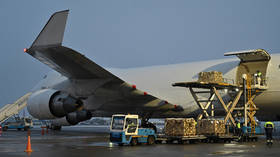US offered Pakistan IMF sweetener for Ukraine weapons – media

The United States brokered a loan from the International Monetary Fund (IMF) to crisis-ridden Pakistan in exchange for a secret arms deal, The Intercept reported on Sunday. The outlet, citing sources “with knowledge of the arrangement” and government documents on both sides, claimed that the weapons were meant to supply the Ukrainian military amid its ongoing conflict with Russia.
According to The Intercept, earlier this year, an insider within the Pakistani military leaked records of arms deals between the United States and Pakistan spanning from the summer of 2022 to the spring of 2023. The exchange was facilitated by Global Military Products, a subsidiary of Global Ordnance, a company seemingly connected to Ukraine. The leaked documents showed American and Pakistani contracts, licensing, and requisition documents “related to US-brokered deals to buy Pakistani military weapons for Ukraine,” according to the Intercept.
The arms sale not only provided much-needed liquidity but also garnered significant political support from Washington, ultimately playing a “key role” in Pakistan’s securing a crucial bailout from the IMF. The IMF had set specific financing and refinancing targets for Pakistan, particularly concerning its debt and foreign investments. According to The Intercept, the proceeds from the munitions sale earmarked for Ukraine went a “long way” in bridging the financial gap that Pakistan was grappling with.
Former Prime Minister Imran Khan, who appeared to have adopted a diplomatically ‘neutral’ stance, was removed from power following a no-confidence vote organized by the Pakistani military, allegedly after being pressured by the US.
Khan’s visit to Moscow in February 2022, which marked the first by a Pakistani prime minister in 23 years, seemed to irk Washington. In a leaked diplomatic cable, US Assistant Secretary of State for the Bureau of South and Central Asian Affairs Donald Lu conveyed his concerns to Pakistani Foreign Secretary Asad Majeed Khan. Lu cautioned that Europe would follow the US in isolating then-Prime Minister Imran Khan over the Ukraine conflict. He also emphasized the potentially severe consequences if the leader remained in power and assured that “all would be forgiven” if he were replaced. Washington has vehemently denied exerting pressure on Islamabad to oust the prime minister.
Since his removal from office, Khan has faced over 150 legal cases and remains incarcerated until at least September 26. His supporters believe these charges are a ploy to prevent him from participating in future elections. The former prime minister’s arrest led to widespread protests throughout Pakistan, prompting the military to intensify efforts to quell the demonstrations and suppress dissent.
The Intercept also reported that on May 23, 2023, Pakistani Ambassador to the US Masood Khan reportedly had a meeting with Lu, during which the US official convinced him that Pakistan’s arms sales to Ukraine, amounting to $900 million, could bolster the country’s financial standing in the eyes of the IMF. These funds could have assisted Pakistan in bridging the remaining financing gap required by the IMF.
Currently, Pakistan is embroiled in a year-and-a-half-long political crisis compounded by severe economic challenges. With rising prices of essential commodities like food, gas, and oil nationwide, Pakistan has introduced an ‘Economic Revival Plan,’ prioritizing investments in critical sectors, including agriculture, mining, information technology, defense, and energy production.













